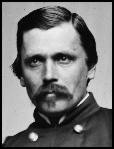
Born: July 8, 1824, Roznow, Wielkopolska, Prussian partition of Poland known as the Grand Duchy of Poznan (presently Poland)
Died: January 31, 1887, New York City, New York, USA
Early days. Father - Stanislaw Krzyzanowski, a wealthy landowner of noble ancestry and a veteran of the Napoleonic Wars. Mother – Ludwika Pagowska.His paternal aunt, Justyna Krzyzanowska, was the mother of the Polish composer and pianist Fryderyk Chopin. Financial problems forced his family to sell the estate in 1827. After the death of his father, his mother and siblings moved to the Russian partition of Poland, while Wlodzimierz was adopted by his father’s family in Poznan (Prussian partition) where he attended the high school.
Insurrection. Escape to the USA. In 1848 young Krzyzanowski took an active part in the Polish insurrection (under Ludwik Mieroslawski) against Prussia, which forced him to escape his native Poland in order to avoid arrest. Making his way to the German port at Hamburg, he eventually sailed for the United States.
Following his arrival in New York City, Krzyzanowski learned to speak English and worked as a blue collar worker simultaneously continuing his education. Later he found employment as an engineer and surveyor in the forests of Virginia. Still later he participated in tracing new railroad tracks .
Marriage. Turner's Rifles. In 1854 he married Caroline Burnett, the daughter of General Burnett. When the Civil War began in 1861, Krzyzanowski lived in Washington, DC, where he formed a small company. He was also a functionary in the Republican Party, which at that time had in its program abolition of slavery. He raised a militia company, Company B, Turner's Rifles, District of Columbia Militia, of which he was Captain. When this unit's term of service ended, Krzyzanowski went to New York to raise a larger unit.
,b>Polish Legion. This unit, originally known as Morgan's Rifles, comprised primarily of Germans and Poles became the 58th New York Company, also known as the "Polish Legion" ," with Krzyzanowski commissioned as captain of the regiment.
Cross Keys, Bull Run. Krzyzanowski's regiment's first engagement was at the Battle of Cross Keys, Virginia, on June 8, 1862, where they fought against the army of General Thomas J. "Stonewall" Jackson. A month later, at the Battle of Second Manassas (or Bull Run), "Kriz," as he was known in the army, commanded a brigade in General Franz Sigel's I (later XI) Corps. His brigade did not fight in the subsequent campaigns at Sharpsburg and Fredericksburg, but in May of 1863, at Chancellorsville, they were overwhelmed by General Jackson's famous flank march. Then, on November, 29, 1862, Krzyzanowski was appointed to the rank of brigadier general, but the Senate failed to act on the appointment and it eventually expired by law on March 4, 1863. (According to General Carl Schurz, the failure to put forth Krzyzanowski's nomination was due to the inability of individual senators to pronounce his name).
Gettysburg, Chattanooga. At Gettysburg, on July 2, 1863, his brigade again fought in conjunction with the XI Corps. During the battle, Krzyzanowski's horse was killed by an enemy shell and he tumbled to the ground severely injuring his chest. Nonetheless, he remained behind on the field, leading his brigade throughout that day's intense fight. After Gettysburg, the XI Corps and Krzyzanowski's brigade fought in the Battle of Chattanooga, Tennessee, in November of 1863. He served out the war as the commander of the defenses of the Nashville and Chattanooga Railroad. On March 2, 1865, Krzyzanowski received a brevet as brigadier and was mustered out on October 1.
In the postwar years, Krzyzanowski was given a succession of minor appointments in California, Alaska and South America by the Federal government. He lived in San Francisco till 1878 and met there among others Henryk Sienkiewicz and Helena Modrzejewska.
Treasury Department. In 1883 he was appointed special agent of the Treasury Department in the New York custom house, an office which he held until his death caused by asthma and a lung disease on January 31, 1887. Four days later, on February 3, a Requiem Mass was said for him at St. Stanislaus Polish Catholic Church in New York City. After the religious service, his body was brought to Greenwood Cemetery, Brooklyn, for burial.
Reinterred at Arlington. Some fifty years later, in 1937, Polish leaders from across the United States arranged to have the late general's remains exhumed from Greenwood and reinterred at Arlington National Cemetery with full military honors. Following a memorial service at the Church of Our Lady of Czestochowa in New York City, the general's remains were accompanied by train to Arlington by some 500 members of Polish-American societies as well as his son, John Krzyzanowski, and several of his grandchildren. At the cemetery, in the presence of Polish president Ignacy Moscicki, President Franklin D. Roosevelt broadcast a final tribute to the great Polish-American Civil War hero via national radio.
"General Krzyzanowski, whose patriotism we commemorate today, is another link to bind us to the people from which he came in the full tide of youthful promise when shadows lay over the land which gave him birth. It is high privilege to bear witness to the debt which this country owes to men of Polish blood. . . .
These are the thought and reflections that come to mind today as we consign to Arlington National Cemetery the honored dust of a son of Poland who faithfully served the country of his adoption. General Krzyzanowski was the embodiment of the Polish ideal of liberty. . . ." said President Roosevelt.
This a modified version of the biography copied from
Zorich
with the permission of the author John Zorich.
Other sources used:
Langowski
Polish American Cultural Center
Joseph Dynia
For liberty and justice : the life and times of Wladimir Krzyzanowski
Published in Unknown Binding by Polish American Congress Charitable Foundation
Author: James S. Pula
Return to home page:
Prominent Poles